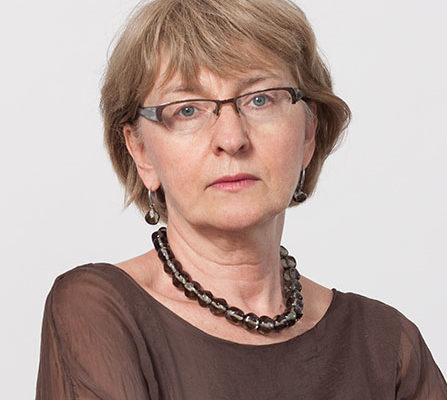Галина Маркова е доктор по социална работа.
Завършва магистърска програма по клинична социална работа в НБУ през 1995 година и докторска програма по социална работа в Колежа Смит, САЩ през 2004 г.
Дисертацията й е върху изследване на психологични характеристики на родители, настанили децата си в домове.
Работата й в областта на деинституционализацията започва с участие в изследване на ефекта на програма в дом за бебета. Участва в закриването на дома в с. Могилино. Провежда обучения по темата, създава приложни проекти за работа с деца от домове. Предпочитана теоретична рамка, в която консултира и която преподава, е “Теория на привързаността”.
Публикации по темата „Деинституционализация”:
- Markova, G. (2011) Attachment Theory and Child Protective Practice. When a State Becomes a Parent: Orphanages in a Post-Totalitarian Culture. Book chapter in Berzoff,J, Falling Through the Cracks: Psychodynamic Practice with Vulnerable and Oppressed Populations.
- Berzoff, J., Kita, E., Segal, C., Markova,G , (2011 ). Falling through the Cracks: Psychodynamically-oriented Social Care with Vulnerable, At-risk Clients. Paper presented at 57th Conference of Council of Social Work Education., Atlanta, USA.
- Markova, G. (2010). Parents, Children, Institutions in a Post-Totalitarian Context. VDM Verlag dr. Muller Aktiengesellschaft & Co. KG.
- Markova,G., Shilkret, R.,Djalev,L. (2008). Parents’ attachment styles, mental representations, and institutionalization of children in Bulgaria. Infant Mental Health Journa,29, 6, 555-569.
- Маркова, Г., Джалев, Л.(2007). Родителски стилове на привързаност – изследване и приложение в социалната работа. ( Parent’s attachment styles-research and application in social work practice). Проблеми на Социалната Работа. Образование Практика, Научни Изследвания(Anthology of articles published by the Bulgarian Association for Social Work Education) ИК-Кота, София..297-308.
- Bilson, A., Markova, G. (2007). But you should see their families: Preventing child abandonment and promoting social inclusion in countries in transitionSocial Work and Social Sciences Review, 12 (3), 57-78.
- Bilson A. and Markova G. (2005). Но вы должны увидеть их родителей (But you should see their families) Жуpнал Казахской академии труда и социальных отношений (Journal of the Kazakh Academy of Labour and Social Relations) Almaty.
- Markova,G.(2007). Russia’s Abandoned Children: An Intimate Understanding. Book Review. Smith College Studies in Social Work, 77 (4), 123-127.
- Markova,G. (2007). Relationships between Parental Mental Representations and Reproduction of Institutionalization in Bulgaria Paper presented at the 10th Conference organized by the National Committee of Psychoanalysis in Social Work. Chicago, USA.
- Markova,G. (2006). Long-term Institutional Care, Parenting and its Reproduction – Object Relations Theory Perspective. Implication for De-institutionalization. Challenges for Fostering and Aftercare. Athens, Greece.
- Markova,G.& Shilkret, R. (2005) The relationship between Parental Attachment Style and Mental Representation and Institutionalization of Children in Bulgaria. Poster presentation at the Society of Child Research and Development Biennial Meeting, Atlanta, USA.
- Markova, G. (2005). Out-of- home Care in Bulgaria: Political, Psychological, and Cultural Perspective. Paper presented at the European congress “Quality4Children”, Gmunden, Austria.
- Markova, G. (2004) Institutionalization of Children in Bulgaria – an Interplay between Social, Psychological and Political Factors. Parent’s Motivations for Institutionalization of Children – Mental Health Perspective. Presentation at the 6th International Conference: Inclusion and Mental Health in the New Europe. ENMESH, London, UK.
- Markova,G., Kurchieva,D. (2004). Program for Prevention of Institutionalization and Reunification of Institutionalized Children. Paper presented at International Social Work conference. Kiten, Bulgaria.
- Markova, G. (2005). Children, Parents, Institutions. Paper, presented at the Conference “Medical Rehabilitation and Psycho-Social Assistance of Torture Survivors in Bulgaria: 10 years Center “ACET” Psycho-Social Program for Victims of Violence and Trauma” Assistance Centre for Torture Survivors – ACET, Sofia, Bulgaria.
Проекти за деинституционализация и развитие на алтернативни грижи за деца и семейства
2010 – “Детство за всички”, ДАЗД. Експерт.
2010 – “Интеграция на деца от дом в общността чрез въвеждане на метода работа по случай”, НБУ. Координатор, обучител.
2008 – “Първо децата” – Деинституционализация на деца с увреждания от Могилино, UNICEF. Супервизор.
2008 – $Деинституционализация чрез осигуряване на услуги в oбщността за рискови групи. Превенция на институционализация, деинституционализация, и реинтеграция на деца в Ромския квартал Факултета”, PHARE. Супервизор, обучител.
2008 – “Деинституционализация чрез осигуряване на услуги в общността за рискови групи. Превенция на институционализация, деинституционализация и реинтеграция – „Под един покрив”, Програма в общността в гр. Монтана”, PHARE. Обучител, супервизор.
2004-2005 – Разработване, прилагане и разпространяване на програма за превенция на институционализацията и реинтеграция на институционализирани деца. Програма МАТРА на кралство Нидерландия.
2002-2003 – Evaluation of a Community Program for Families at Risk “Take me home 2”, funded by Save the Children, UK.

